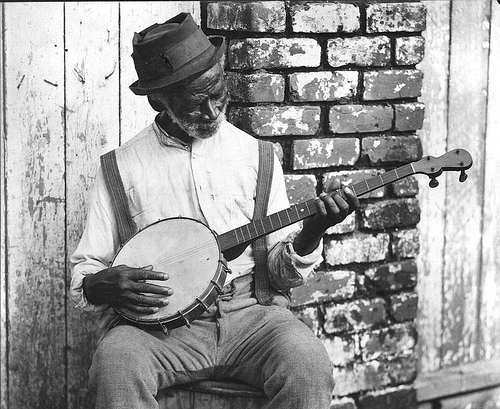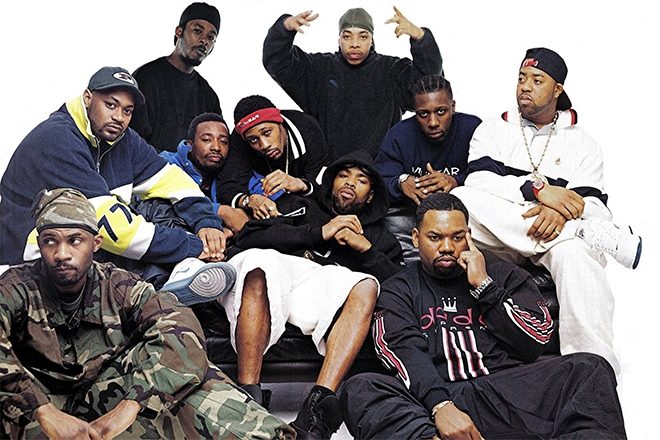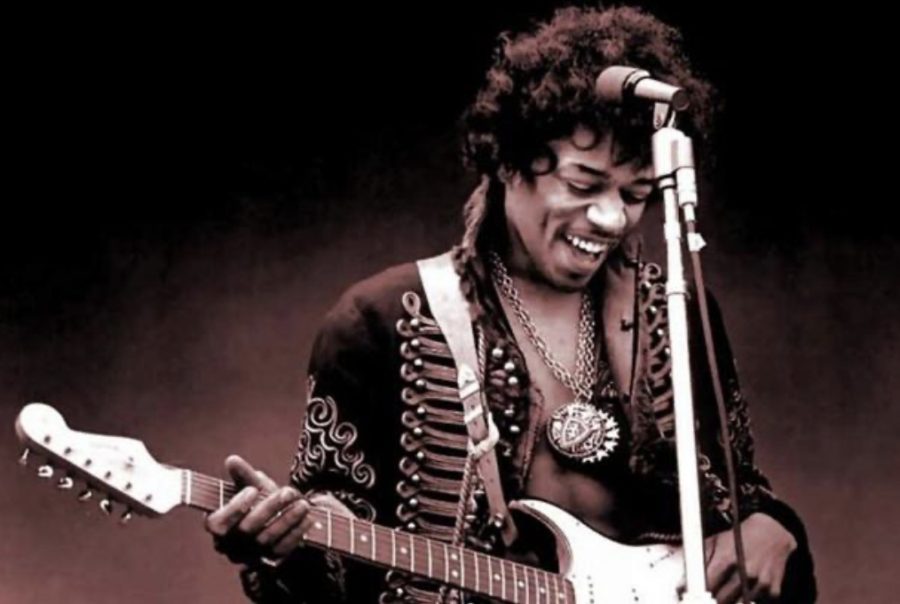Black History Through Music
February 24, 2023
On the month of February, we can appreciate Black history and Black people’s achievements for countless reasons. Me personally, I love music. Along with that, music has got to be one the most black-influenced things out there, being responsible for countless genres and innovations within the industry. We can thank Black people for rock and roll, blues, hip-hop, r&b, funk, ska, and plenty more. Let’s take a deeper dive into some important people and their contributions to Music.
All throughout horrible times in America, spirits were kept up thanks to music. Both enslaved and free Black people sang songs constantly. Some themes included hardships of working and dreams of freedom. The melodies and rhythms of these songs were inspired heavily from West Africa, where many slaves were brought over from. Interestingly enough, very many of these tunes actually had coded messages within them, to communicate with other slaves without drawing suspicion from slaveholders. Many messages talked about the underground railroad and ways to escape to it.
 The first time Black people were responsible for a new wave of music came with the banjo. This instrument of African origin spread through the community like wildfire in the 19th century. Many would pick up the instrument and learn/create songs that they might keep to themself or instead show others, and have a massive influence on the music industry at the time. The banjo had many variations at the time, but the 2 most common were the West-African 3-stringed banjo and the more European influenced 5-string banjo.
The first time Black people were responsible for a new wave of music came with the banjo. This instrument of African origin spread through the community like wildfire in the 19th century. Many would pick up the instrument and learn/create songs that they might keep to themself or instead show others, and have a massive influence on the music industry at the time. The banjo had many variations at the time, but the 2 most common were the West-African 3-stringed banjo and the more European influenced 5-string banjo.
Almost parallel to the banjo in history, the origin of soul music began in the 1830s. Thanks to the Second Great Awakening, many African Americans adopted Christianity as their religion. Early spiritual music was heavily inspired by the previously mentioned work songs that many slaves sung. Just like the traditional work songs, a lot of this Christian music was a much better cover-up for the coded messages that were already hidden within the songs. Toward the latter-half of the 19th century, these spiritual tunes were widespread enough to the point many black people who were simply waiting for their turn at the barber would begin to harmonize, leading to the origin of the classic barber shop quartet.
The early parts of the 20th century saw the emergence of possibly the two most accredited genres to Black people, of course being blues and jazz. At this time in history, there weren’t any big names associated with this genre, but that was soon to change. The Harlem renaissance gave birth to a brand new crowd of performers, who’s go to instrument was the brilliant trumpet. Jazz couldn’t be complete without drums either. Many drum-patterns within this style of music were very cymbal heavy. You can’t mention this era of Black music without talking about the influence they had in theater. At the time, Black people began to write and produce their own musicals, as well as being granted more impressive roles within operas, and writing some themselves. A leading figure in the Harlem Renaissance was Scott Joplin, who essentially invented the Ragtime style, similar to Jazz, but instead more focused on catchy melodies. Any popular music in this category that was appreciated by White people at the time was given the name “Race Music”, which stuck for longer than it should have.
Not too much later we would begin to see names like Miles Davis and John Coltrane rise up in the world of Jazz. At the turning point of Jazz music, subgenres emerged (as they always do), such as modal jazz (a sadder, down-tune variation) and free jazz (which you might hear if you were going to see a live performance). Some genres take such a turn that they can be classified as entirely in-their-own, which is where we see the beginnings of Rock and Roll. Yes, Rock and Roll, one of the genres most associated with older White guys was started by brilliant Black people from history. Louis Jordan and Wynonie Harris were among the first to put this kind of spin on jazz, using a strong back-beat instead of the simple cymbals. The first big names within Rock and Roll were Elvis Presley and Bill Haley who were unfortunately credited with the start of it. Some Black names were still seen in the spotlight, like Chuck Berry, who was, and still is very appreciated.
The 50s saw the start of R&B, which stands for Rhythm and Blues (I know the genre today is nothing like the blues from this time period, but that’s music for you). Back then, it was synonymous with Rock and Roll in many ways, with a more melodic perspective. Through the same decade, Elvis was only gaining more and more notoriety. Despite the times, Elvis indulged in music from many backgrounds, and took a lot of inspiration from Fats Domino, a Black artist who was no less talented than the man himself. On a separate timeline, Soul music is developing into what it is today. Ray Charles is a name many are familiar with, and a pioneer within the Soul style. Other genres arise from blues, like Doo-Wop and Surf (which is where the 60s got “the twist” from, possibly the most well-known dance to exist.
 Despite the creation of Motown Records, a mostly Black label, the 60s begins a sort of recession for black music. This is accredited to the absolutely viral British Rock invasion that happened in this decade. The most well-known bands like The Beatles and The Rolling Stones STILL remain influenced in countless ways by Black music, once again with blues at the top of these. Behind the scenes, we begin to see funk develop, which like blues, led to countless genres in the future. Stevie Wonder was the headliner of funk, who was popular due to his association with Motown. We can’t talk about the 60s without mentioning the mastermind that was Jimi Hendrix. One of the first to bring the electric guitar to it’s full potential, he and some other bands at the time invented Psychadelia. Hendrix was really the first to use many effects on his guitar, like fuzz and wah wah. The fact he was a solo act proves so much as to what you can accomplish, even when juggernauts like The Beatles existed at the same time.
Despite the creation of Motown Records, a mostly Black label, the 60s begins a sort of recession for black music. This is accredited to the absolutely viral British Rock invasion that happened in this decade. The most well-known bands like The Beatles and The Rolling Stones STILL remain influenced in countless ways by Black music, once again with blues at the top of these. Behind the scenes, we begin to see funk develop, which like blues, led to countless genres in the future. Stevie Wonder was the headliner of funk, who was popular due to his association with Motown. We can’t talk about the 60s without mentioning the mastermind that was Jimi Hendrix. One of the first to bring the electric guitar to it’s full potential, he and some other bands at the time invented Psychadelia. Hendrix was really the first to use many effects on his guitar, like fuzz and wah wah. The fact he was a solo act proves so much as to what you can accomplish, even when juggernauts like The Beatles existed at the same time.
The following decade didn’t see the emergence of many new genres, since existing ones were instead improved upon. Disco was the only one to flourish during this time, another genre that we can thank Black people for. Bands like The Jackson 5 and Earth Wind and Fire created timeless classics, and paved the way for all-black bands to recieve for notoriety. The very late 70s saw the EARLY beginnings of hip-hop. Run-D.M.C. were honestly the first to do anything like this. Many of their songs still contain a guitar in one way or another, but have new drum patterns never seen before. The way the group switches between their members on songs and this brand new flow gave way to hip-hop’s birth, which as of 2023 is the most successful genre for Black people.
The King of Pop emerges in the 80s with his first big hit, Off the Wall. Michael Jackson is one of, if not the most influential figure to ever exist within Pop music. His next album Thriller was not only influential, but to this day is the best selling of all time. Jackson opened the door for countless artists to follow in his footsteps, some of which are Prince, Lionel Richie, Luther Vandross, Tina Turner, Whitney Houston, and Janet Jackson (sister). After Run-D.M.C.’s new genre spread its roots through the Black community, the later part of the 80s saw the beginning of the hip-hop renaissance. I could go on and on about all the rappers that made a legacy for themselves in this era, but that would take days. Some very important names include Dr. Dre, Snoop Dogg, Ice Cube, Notorious B.I.G., Wu Tang, and Jay-Z.
 The 90s continued the outreach of hip-hop, most importantly with Tupac who was among the first to adapt the poetic style to his lyrics, where many of his songs have messages about various things, such as living as a Black man in america and his life growing up. Ms. Lauryn Hill was one of the most important Black women in music at the time, creating a fusion between hip-hop and R&B that shaped the genre into what it is today. Wu Tang members began solo projects that gained notoriety, and other groups started out like Outkast and A Tribe Called Quest. In the early 2000s, J Dilla released Donuts, something never really seen before that took elements of hip-hop but removed most of the lyrics, making for a more relaxed listen. The 2000s are also home to Kanye, who puts yet another new twist on rap music, combining it with pop to make a very unique sound that many have adapted to after him.
The 90s continued the outreach of hip-hop, most importantly with Tupac who was among the first to adapt the poetic style to his lyrics, where many of his songs have messages about various things, such as living as a Black man in america and his life growing up. Ms. Lauryn Hill was one of the most important Black women in music at the time, creating a fusion between hip-hop and R&B that shaped the genre into what it is today. Wu Tang members began solo projects that gained notoriety, and other groups started out like Outkast and A Tribe Called Quest. In the early 2000s, J Dilla released Donuts, something never really seen before that took elements of hip-hop but removed most of the lyrics, making for a more relaxed listen. The 2000s are also home to Kanye, who puts yet another new twist on rap music, combining it with pop to make a very unique sound that many have adapted to after him.
I could go on and on about the countless Black artists that rose up after the 2000s, but once again, that list would be endless. One I must highlight is Kendrick Lamar, who while lyrically, bares many similarities to Tupac, he creates a brand new style. Albums like Good Kid Maad City and To Pimp a Butterfly (The best rap album ever made) talk about Black struggles, and other albums like Damn. are less focused on those topics, and more on just creating great music. A few Black artists that fit in together pretty well are Dean Blunt, Slauson Malone, and C’est La Key, who strive to create projects that more resemble art that a lot of other music does. Through the years, Black people have spread into every genre imaginable, and have also created a very large portion of the most important ones through history. During Black History Month, it’s important to appreciate all they’ve done, and Music is a great place to start.
